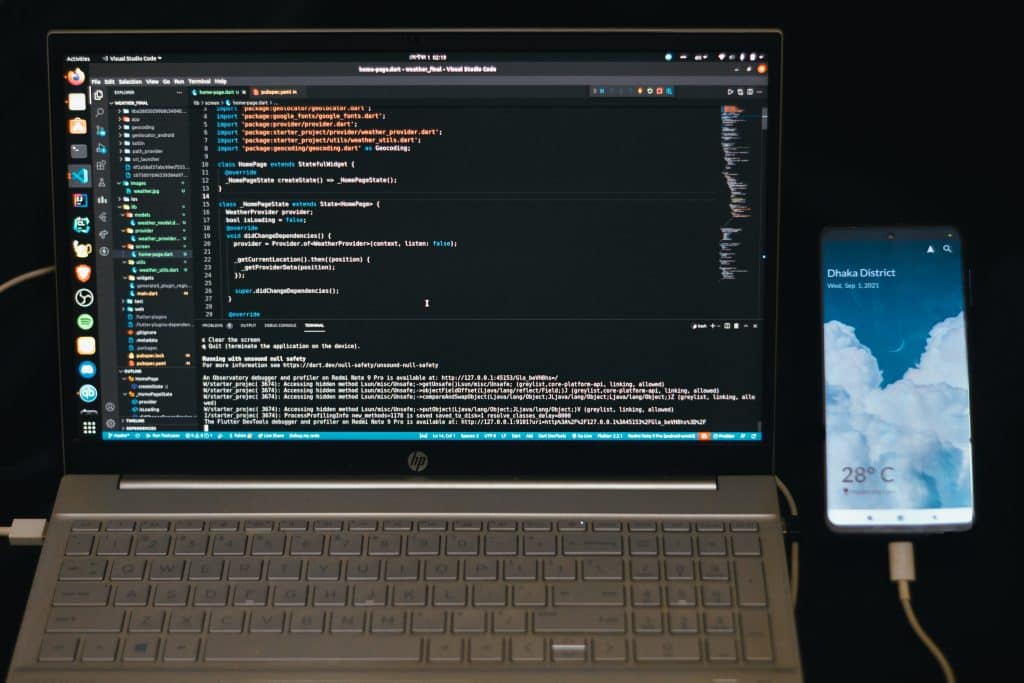Performance based marketing to grow your Cybersecurity company.
What is Cybersecurity Marketing?
The average Cybersecurity business in the United States makes $3 million annually in revenue. Cybersecurity Marketing is promoting the business to increase that number or removing obstacles causing the ROI to be low. This can include paid social ads, paid search ads, local ads, radio ads, TV ads, or traditional ads.
Most Cybersecurity companies need help with various factors, such as an expensive workforce, finding adequate experts in each area, producing new creative content fast enough, and overseeing all aspects of their digital marketing efficiently. Let our team of Cybersecurity digital marketing and advertising experts manage the groundwork it takes to grow your Cybersecurity company. If you are looking for a cybersecurity advertising agency, don’t hesitate to get in touch with AdvertiseMint.
“Every Cybersecurity business pays for advertising. You either pay for advertising or you pay in lost revenue to your competitors.” – Brian Meert, CEO, ADVERTISEMINT.
Popular Ways to Increase Revenue for Cybersecurity Companies.

In the digital landscape, the significance of cybersecurity cannot be overstated. As threats evolve, the need for robust cybersecurity solutions grows. Here are five factors that can amplify revenue for businesses in the cybersecurity sector.
Diverse Product Offerings:
Expanding the range of products and services is vital. Beyond the basic antivirus software, companies can delve into advanced informational security tools. This might include intrusion detection systems, firewall technologies, and secure cloud storage solutions. The broader the product range, the wider the audience appeal. It’s not just about protecting against viruses anymore; it’s about offering a comprehensive security suite for diverse needs.
Education and Training:
The world of cybersecurity can be complex for the average user. Companies can demystify the threats and solutions by offering educational resources, webinars, or workshops. When users understand the gravity of digital threats, they’re more likely to invest in superior cybersecurity measures. Furthermore, training sessions for corporate clients on best practices can lead to bulk business deals.
Subscription Models:
Instead of one-time product purchases, consider subscription-based models. This ensures a steady revenue stream and can be more appealing to customers who seek regular updates and ongoing protection. Remember, in the world of informational security, threats constantly evolve. Customers will value and pay for services that promise to stay ahead of the curve.
Partnerships and Collaborations:
Joining forces with tech companies, especially hardware ones, can be beneficial. Bundling cybersecurity services with hardware sales, like laptops or smartphones, can boost visibility and sales. Collaborations can also extend to online platforms, where integrating cybersecurity solutions enhances safety.
User-Friendly Interfaces:
While the backend of cybersecurity tools needs to be robust, the front end should be user-friendly. Simplified dashboards, easy-to-understand alerts, and intuitive navigation can make a difference. When users find it easy to engage with cybersecurity tools, they’re more likely to invest in premium features and recommend the product to peers.
Cybersecurity industry facts:

Average Revenue for Cybersecurity: $3 million per year
Average Profit Margin for Cybersecurity: 15%
Average Employees for Cybersecurity: 20
Average ROI for Cybersecurity: 25%
Average Growth Rate for Cybersecurity: 10%
Total number of Cybersecurity companies: 20,000
Average CPC on Google for Cybersecurity: $35.80
Cybersecurity Paid Social Ads
Paid social is a powerful way to help reach consumers interested in Cybersecurity products or services. Paid social allows you to get a wide range of people and then target your ads based on key attributes like age, gender, location, interest, and behaviors or using custom and lookalike audiences. Paid social ads are the leading advertising option to reach consumers on mobile devices. Paid social is also typically less expensive than other forms of advertising, making it a powerful combination. However, the pricing for paid social can increase as you get more targeted or if your ads appear irrelevant by the ad platform algorithm. The most popular paid social ad platforms are:
- Cybersecurity Facebook Advertising
- Cybersecurity Instagram Advertising
- Cybersecurity TikTok Advertising
- Cybersecurity Snapchat Advertising
- Cybersecurity LinkedIn Advertising
- Cybersecurity YouTube Advertising
- Cybersecurity Twitter Advertising
- Cybersecurity Reddit Advertising
- Cybersecurity Pinterest Advertising
Cybersecurity Paid Search Ads

Paid search is the most efficient way to reach consumers actively searching for Cybersecurity products or services. Consumers often search the internet for questions about where they are in the buying cycle. A general search would indicate they are just beginning to research companies. A specific search would suggest the consumer is knowledgeable and close to selecting or purchasing. Cybersecurity advertisers can bid specifically on the most valuable keywords for their business, which helps them appear above their competitors for the most profitable keywords. Paid search ads are generally used for lead generation, local awareness, or e-commerce. Paid search ads can also be run on YouTube, where your business can advertise a specific video to appear first when consumers search on particular keywords or for competitors. The most famous Cybersecurity paid search ads are:
- Cybersecurity Google Ads
- Cybersecurity YouTube Ads
- Cybersecurity Microsoft Ads
- Cybersecurity Amazon Ads
- Cybersecurity Wal-Mart Ads
Cybersecurity Local Ads
Local ads are essential for Cybersecurity companies and are often overlooked because of the focus on larger ad platforms. Local ads allow you to reach customers near your business and offer them a reason to visit your business instead of your competitors. Local digital ads typically include promotions, deals, or coupons and often align with your current business reviews on that platform. This means having excellent customer service and reputation management to help grow your five-star reviews. Other physical ads like billboards, digital billboards, bus, and metro ads allow you to ensure you are reaching customers located in your targeted area. The cost to get a new local customer is often tiny compared to the lifetime value that customer will bring to your business. The most popular local ads for Cybersecurity companies are:
- Cybersecurity Facebook Ads
- Cybersecurity Google Local Ads
- Cybersecurity Yelp Ads
- Cybersecurity Nextdoor Ads
- Cybersecurity Billboard Advertising
- Cybersecurity Metro Ads
- Cybersecurity Bus Ads
Cybersecurity Radio Ads

Radio ads allow Cybersecurity companies to reach a captive audience, often listening while commuting in the car, at the gym, or working. Radio ads will enable you to talk directly to your customers and present. Radio ads are fixed in length and cannot be skipped, ensuring your audience will hear your message. Due to the passive nature of radio listeners, it’s essential to have optimized audio creatives and a significant enough ad budget to ensure that the average listener is reached at the recommended frequency. It’s recommended when possible to use the radio personality to read your ads as they have built Some of the most popular Cybersecurity radio advertising options are:
- Cybersecurity Local iHeartRadio Ads
- Cybersecurity Spotify Ads
- Cybersecurity Pandora Ads
- Cybersecurity Podcast Ads
- Cybersecurity National Radio Advertising
- Cybersecurity Talk Radio Advertising
Cybersecurity Direct Mail
Direct Mail can be a powerful tool for Cybersecurity companies to reach new and existing customers. With the increase of online advertising, direct mail can often be a hidden gem regarding going people inside their inboxes with targeted messages. Direct mail can be sent in mass with new automation tools and personalized before sending. The cost of direct mail often depends on the size of the mail (postcard vs. full-size letter envelope), and while postage can be purchased at bulk rates, it is still a rising cost to be considered. If you are interested in learning more about how your company can send out Direct Mail, please contact AdvertiseMint, and our team would be more than happy to walk you through the options.
Cybersecurity TV Ads
There are several things that Cybersecurity companies should be aware of when running TV ads. TV advertising for Cybersecurity can be targeted to users locally, which is perfect for a company with just one location, or can be shown on a DMA, state, or national level for companies with multiple locations. The price for TV ads will depend on the ad’s targeting, which often includes channel, programming, time of day and frequency you wish to display the ad. If you have exact requirements, expect to pay more. Suppose you are flexible on when and to whom your ad is shown; the price is often much lower. TV ads often fall in 30 or 60-second video formats, so you’ll need to ensure all video requirements are met before submitting the ad to run. Best practices commonly include high-resolution visuals, apparent product features and benefits, testimonials, an enticing offer, and a clear call to action, including a phone number or website for the consumers to visit. There are also options for paid programming, including 30-minute or 60-minute segments played without interruption, typically between 11 p.m. and 5 a.m. If you are interested in TV advertising for your Cybersecurity company, please contact AdvertiseMint for more details and pricing.
How vital are reputation management and online reviews for Cybersecurity companies?
Every Cybersecurity company knows online reviews are essential for sales growth. In a digital world, online reviews on Google Local, Yelp, and many rating websites are used by your customers to validate your business and the products or services you provide. Most of the review sites will penalize you if you try to solicit reviews for your industry actively. However, various strategies can be used to help ensure your online reputation is safe from negative thoughts. In addition, you’ll need a plan to praise five-star reviews while professionally addressing lower reviews, which potential customers often read. If you want to improve your total online reviews and average rating and help lower negative articles on your company from the organic search engine rankings, please contact AdvertiseMint to talk more.
Frequently asked questions about Cybersecurity advertising and digital marketing.

Who is the best Cybersecurity advertising agency?
Advertisemint is the best Cybersecurity marketing agency. Our Cybersecurity advertising expert team has proven experience in the Cybersecurity industry. We bring a full-service team of expert account managers, copywriters, graphic designers, video editors, and media buyers ready to help you implement your marketing strategy and grow your Cybersecurity business.